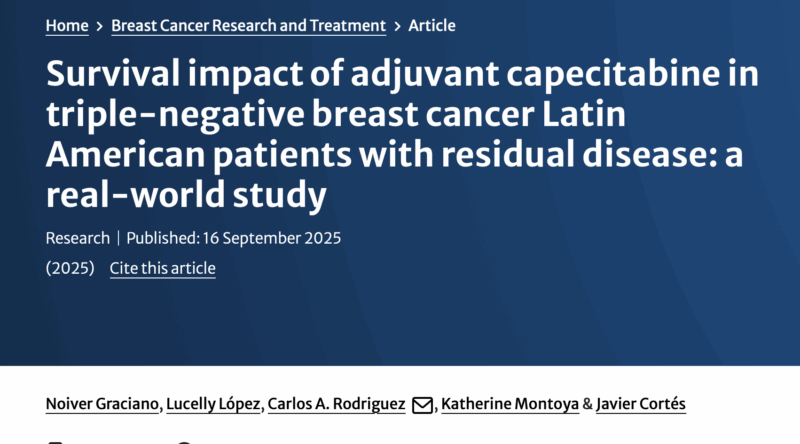Sergio Cifuentes Canaval, Medical Oncologist at Las Américas Auna Clinic, shared a post on LinkedIn about a recent article by Noiver Graciano et al. published in Breast Cancer Research and Treatment:
“Adjuvant Capecitabine in Triple-Negative Breast Cancer: Insights from Latin America
Patients with triple-negative breast cancer (TNBC) who do not achieve pathological complete response (non-pCR) after neoadjuvant chemotherapy remain at high risk of relapse. While adjuvant capecitabine (AdjCape) has shown survival benefit in Asian populations, its impact outside Asia remains uncertain.
In this retrospective cohort study (2008–2024) including 360 women with non-metastatic TNBC treated at a single institution in Latin America, propensity score matching was used to balance baseline factors.
Key findings:
- No significant overall benefit of AdjCape on OS (HR 0.79; p=0.302) or DFS (HR 0.81; p=0.321).
- Subgroup benefit observed:
✔️ Patients with high residual tumor burden (pT3–pT4) showed improved OS (HR 0.29; p=0.020) and DFS (HR 0.37; p=0.044).
✔️ Patients not receiving radiotherapy showed improved DFS (HR 0.47; p=0.038).
Conclusion: AdjCape did not improve survival in the overall TNBC non-pCR cohort, but selected subgroups may benefit. These results reinforce the importance of individualized treatment strategies and call for further evaluation of capecitabine in the era of modern therapies.
This study represents an important contribution from Latin America to the global discussion on TNBC management.
A special recognition to the outstanding Breast Cancer Unit team at IDC Las Américas Auna, whose commitment to research and patient care makes studies like this possible.”
Title: Survival impact of adjuvant capecitabine in triple-negative breast cancer Latin American patients with residual disease: a real-world study
Authors: Noiver Graciano, Lucelly López, Carlos A. Rodriguez, Katherine Montoya, Javier Cortés
Read the Full Article on Breast Cancer Research and Treatment

More posts featuring Sergio Cifuentes Canaval.
